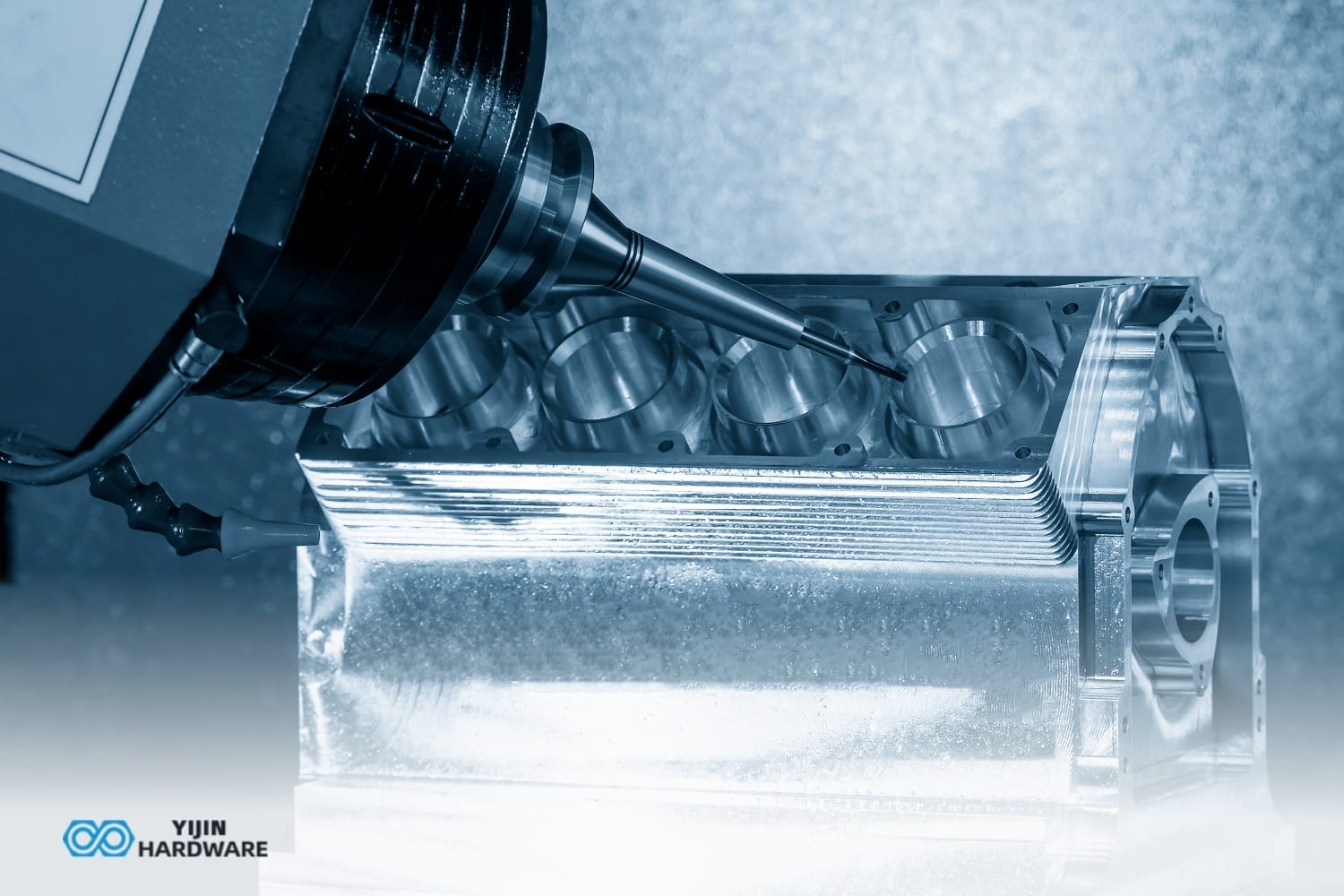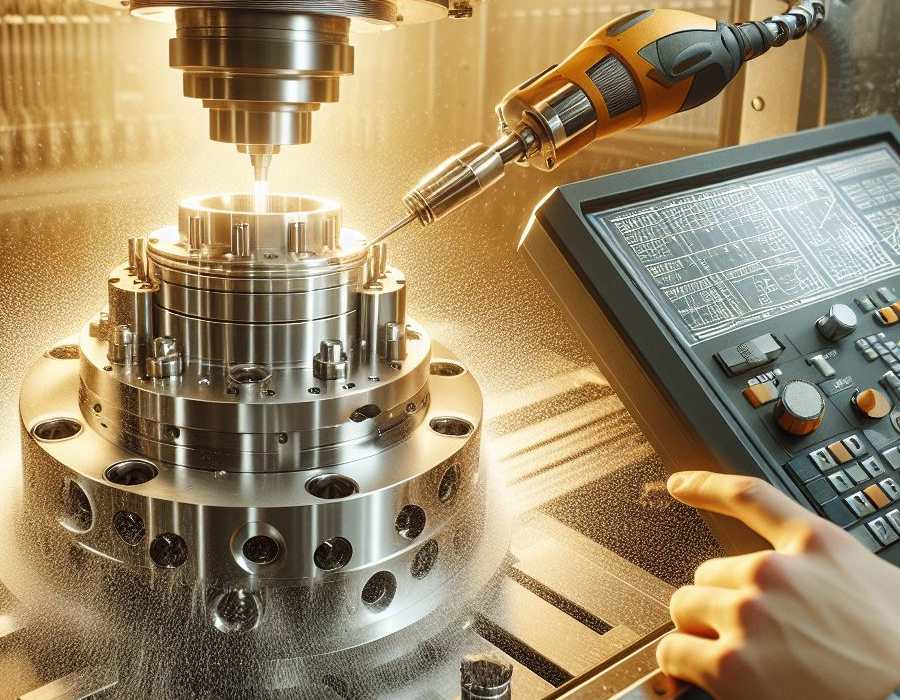How fast prototyping is transforming modern engineering
Wiki Article
Boost Your Production Quality With Expert CNC Machining Providers in Milling and Transforming
CNC machining solutions in milling and transforming deal significant benefits for manufacturing procedures. These processes assure precision and effectiveness, important for producing high-quality elements. With innovative modern technology and skilled machinists, companies can attain intricate layouts and superior coatings. Nevertheless, recognizing the nuances of these solutions is necessary for optimizing their benefits. What factors should business consider when choosing the appropriate CNC machining companion?Recognizing CNC Machining and Its Benefits
Although numerous producing procedures exist, CNC machining sticks out as a result of its accuracy and effectiveness - jig and fixture tooling. This innovative production technique utilizes computer-controlled equipments to produce detailed get rid of marginal human intervention. By automating the machining process, it greatly minimizes the possibility of human mistake, making sure constant top quality throughout manufacturing runsCNC machining uses countless advantages that attract different industries. To start with, it suits complicated layouts that conventional methods may struggle to accomplish. The speed of manufacturing is enhanced, permitting for quicker turn-around times and boosted result. Additionally, CNC machining is flexible, appropriate for a broad array of materials, including metals, plastics, and composites.
The procedure permits for easy adjustments, allowing rapid prototyping and modification without extensive retooling. Because of this, services can react quickly to market demands, making CNC machining a necessary element of modern production techniques.

The Value of Precision in Milling Processes
Precision is important in grating processes, as it straight affects the precision of the end product. The selection of products additionally plays a considerable function, affecting just how well the machining procedure meets specified resistance criteria. Understanding these elements is important for attaining ideal results in CNC machining.Role of Accuracy
Achieving high degrees of accuracy is important in crushing procedures, as even the tiniest deviation can bring about significant errors in the end product. Precision in CNC machining directly influences the performance, capability, and longevity of the produced elements. Exact crushing guarantees that resistances and dimensions are met, which is important for parts that have to fit together seamlessly in assembly or run under particular conditions. Furthermore, the duty of accuracy includes lowering waste and revamp, consequently improving total production effectiveness. Advanced CNC devices equipped with innovative software program and tooling add to obtaining the required precision. By focusing on precision in milling, manufacturers can ensure top quality results that meet strict market criteria and client expectations.
Material Option Influence
Product selection plays an essential role in the milling procedure, affecting both the quality of the last product and the effectiveness of production. Different materials show unique homes such as firmness, tensile toughness, and machinability, which straight impact the milling technique used. More difficult materials may call for customized tools and slower feed prices to stop device wear and keep precision. On the other hand, softer materials can be crushed at higher rates yet might do not have resilience. In addition, the choice of material can affect surface area finish and dimensional accuracy, demanding cautious factor to consider by makers. Inevitably, selecting the suitable product not only boosts item performance yet additionally optimizes the milling process, reducing waste and boosting general performance.Tolerance Standards Significance
While the selection of materials is important, adherence to tolerance standards is similarly essential in CNC machining procedures. Resistance requirements dictate the permitted limits of variation in measurements, making certain parts fit and function correctly. In milling and transforming procedures, accurate tolerances enhance product quality, lower waste, and reduce rework. When resistances are accurately kept, makers can achieve constant results, which is vital for industries such as aerospace, automobile, and medical tools, where accuracy is paramount. Discrepancies from developed standards can result in assembly concerns, compromised efficiency, and boosted prices. Consequently, understanding and carrying out appropriate resistance standards is essential for any kind of CNC machining solution seeking to preserve high production high quality and meet client requirements effectively.Enhancing Efficiency With Advanced CNC Transforming
Advanced CNC turning techniques substantially improve efficiency in element production by making certain high accuracy in manufacturing. This boosted accuracy not only boosts the overall quality of the parts generated yet likewise adds to decreased manufacturing time. Therefore, producers can attain higher output while preserving stringent top quality criteria.Precision in Element Creation
CNC turning innovation has revolutionized accuracy in component development, enabling producers to attain remarkable accuracy and performance. Using computer-controlled lathes, this innovative process meticulously shapes materials into intricate layouts, guaranteeing limited tolerances that satisfy requiring specs. The automation fundamental in CNC transforming reduces human mistake, resulting in continually top quality components customized to certain demands. Furthermore, the ability to rapidly modify digital styles enables quick versions, boosting the customization of parts without compromising accuracy. Because of this, industries varying from aerospace to auto benefit significantly from these advancements, as they can produce complex geometries easily. Ultimately, CNC transforming stands as a foundation of modern-day production, driving precision and integrity in element production.Reduced Production Time

Trick Technologies in CNC Machining
Many essential technologies drive the effectiveness and precision of CNC machining, making it possible for producers to generate complicated get rid of high accuracy. Central to these innovations are Computer system Assisted Design (CAD) and Computer System Aided Manufacturing (CAM) software, which improve the design-to-production procedure. CAD enables complex layouts to be developed and adjusted electronically, while CAM converts these styles into maker guidelines.Further boosting precision are multi-axis machining facilities, which allow cutting devices to move along numerous axes all at once, decreasing the requirement for multiple configurations - tool and die maker. In addition, advancements in tooling products and finishings have boosted sturdiness and efficiency, enabling for much better surface area coatings and extended device life
Automation innovations, including robotics and intelligent software program, assist in real-time surveillance and modifications during production, guaranteeing uniformity useful reference and top quality. Collectively, these modern technologies not only improve production abilities but likewise add to the total integrity of CNC machining solutions.
The Function of Knowledgeable Machinists in High Quality Production
Proficient machinists play a crucial function in making sure the top quality and accuracy of CNC machining manufacturing. Their experience straight affects the end result of manufacturing processes, as they translate technical drawings, established equipments, and choose proper tools for each and every job. By having a deep understanding of machining concepts, they can make real-time adjustments to maximize efficiency and maintain limited resistances.Experienced machinists utilize their analytical capabilities to determine and remedy issues throughout production, protecting against issues and guaranteeing that the final items fulfill stringent quality requirements (jig and fixture tooling). Their knowledge with various materials and machining methods allows them to adjust to diverse task needs, enhancing total performance
Furthermore, these specialists commonly team up with developers and designers, supplying important insights that add to the constant renovation of production methods. Ultimately, the relevance of competent machinists in CNC machining can not be overstated, as they create the backbone of high-grade production operations.
Lowering Waste and Optimizing Resources
Effective CNC machining not just counts on the expertise of skilled machinists yet additionally stresses the significance of lowering waste and optimizing sources throughout the production procedure. By using advanced modern technologies and accurate programs, producers can reduce material waste, ensuring that every item of basic material is made use of efficiently.Including methods such as nesting, where parts are prepared to make best use of product usage, can notably lower scrap production. Additionally, real-time tracking of machine efficiency permits instant adjustments, protecting against overproduction and resource deficiency.
Implementing lasting techniques, such as reusing steel shavings and using environment-friendly products, contributes to both cost savings and environmental responsibility.
Via these actions, CNC machining services can enhance performance while maintaining high-grade criteria, ultimately bring about an extra sustainable and successful operation. By prioritizing resource optimization, companies can accomplish higher effectiveness and a minimized ecological footprint in their manufacturing procedures.
Choosing the Right CNC Machining Solution for Your Demands
Exactly how does one figure out the very best CNC machining service for certain job needs? Selecting the ideal CNC machining service includes several essential considerations. Project specs, including product kinds, resistances, and measurements, have to be clearly defined. This guarantees that the chosen service can satisfy the technical demands of the job.Second, reviewing the provider's competence and experience in the relevant sector can offer insights right into their capabilities. Examining previous tasks and client testimonials can further inform the choice.
Third, reviewing the available modern technology and equipment is crucial, as advanced devices frequently causes greater accuracy and efficiency.
Lastly, price and turn-around time must be taken into consideration to ensure the service aligns with monetary restrictions and deadlines. By thoroughly analyzing these variables, businesses can recognize the CNC machining service that best fits Read More Here their special production requirements.
Often Asked Concerns
What Materials Can Be Used in CNC Machining?
CNC machining can use a selection of materials including metals like steel, titanium, and aluminum, in addition to plastics such as acrylic and nylon, and compounds, offering convenience for various production applications and industries.For how long Does a Common CNC Machining Task Take?
A normal CNC machining task can take anywhere from a couple of days to several weeks, relying on aspects such as intricacy, material kind, layout specs, and manufacturing volume. Timelines differ based upon task requirements and seriousness.Are CNC Machining Provider Eco-friendly?
CNC machining solutions can be eco-friendly, particularly when utilizing sustainable products and effective processes. Waste decrease and energy-efficient machinery add to a lower ecological influence, making these services a viable choice for eco-conscious production.What Industries Frequently Make Use Of CNC Machining Services?
CNC machining solutions are frequently made use of in various sectors, including vehicle, aerospace, electronics, medical devices, and production. These industries count on precision machining for components that need high precision, effectiveness, and repeatability in production procedures.Just How Can I Prepare My Layouts for CNC Machining?
To prepare designs for CNC machining, one should guarantee proper data styles, maximize measurements for resistance, incorporate essential machining features, and think about material homes. Additionally, supplying thorough paperwork can boost the production procedure's performance and accuracy.While the selection of products is crucial, adherence to resistance criteria is just as important in CNC machining procedures. Experienced machinists play a crucial duty in making sure the high quality and accuracy of CNC machining manufacturing. A typical CNC machining project can take anywhere from a couple of days to several weeks, visit this page depending on factors such as intricacy, product kind, layout specs, and manufacturing volume. CNC machining services can be environmentally friendly, specifically when utilizing effective procedures and lasting products. To prepare layouts for CNC machining, one need to guarantee correct file layouts, enhance dimensions for resistance, include necessary machining features, and think about material residential or commercial properties.
Report this wiki page